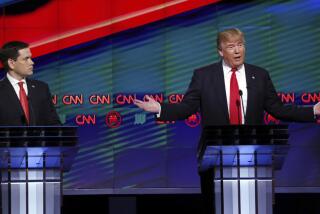Briton in Line to Become Next Head of NATO
LONDON — Prime Minister Tony Blair said Friday that he has nominated Defense Secretary George Robertson to be secretary-general of NATO.
“George has exactly the right mix of defense expertise and political and diplomatic skills,” Blair said in Sarajevo during a Balkans summit.
There are no formal candidates, and selection of a replacement for Spaniard Javier Solana is a matter of consensus. Several names have figured in press speculation, the most prominent of which has been German Defense Minister Rudolf Scharping. Others mentioned include former Belgian Prime Minister Jean-Luc Dehaene, 58, and Hans Haekkerup, 53, Denmark’s defense minister.
NATO sources said Friday that Scharping has ruled himself out to stay in domestic politics.
Solana ends his four-year term in December, but he is expected to leave a couple of months earlier to take up a new job as defense coordinator for the European Union. NATO officials have speculated that his replacement will be named in September, when NATO foreign ministers are in New York for the U.N. General Assembly.
Blair received “positive responses” about Robertson from many leaders at the Sarajevo meeting, including President Clinton, French President Jacques Chirac, Italian Prime Minister Massimo D’Alema and Spanish Prime Minister Jose Maria Aznar, said Alastair Campbell, the prime minister’s spokesman.
Robertson, 53, was appointed defense secretary after the Labor Party’s national election victory in 1997.
In Brussels, a senior NATO diplomat said: “The reaction was enthusiastic, and I think you will see white smoke.” He was referring to the traditional signal used by the Roman Catholic conclave of cardinals when they have chosen a new pope.
“We are pleased with his candidacy,” a spokesman for the U.S. National Security Council, P.J. Crowley, said. “Obviously, there is a process we have to follow within the alliance, but we think he would make a fine secretary-general.
Solana is widely respected for having pushed through NATO enlargement without deeply alienating Russia, and for having held the alliance together through the Kosovo war.
His successor will face the dual challenges of building the European allies’ ability to carry out smaller-scale military operations on their own while preserving the U.S. security commitment to Europe.
It was generally agreed that the qualifications for the NATO job were: The candidate must be a European with government experience in defense or foreign affairs, have close relations with Washington, and have proven public relations skills and management ability.
More to Read
Sign up for Essential California
The most important California stories and recommendations in your inbox every morning.
You may occasionally receive promotional content from the Los Angeles Times.










